

Effects of 24-hour-shift related short term sleep deprivation on cardiac function: a CMR study. Beneficial effects of intermittent fasting and caloric restriction on the cardiovascular and cerebrovascular systems. Gamification Linked to Drop in Blood Pressure. September 22, 2015 Level of achievement on gamification system linked to reduction in systolic, diastolic blood pressure (HealthDay News) -- A higher level of achievements earned on a gamification system is associated with a reduction in blood pressure, according to a study presented at the American Heart Association's Council on Hypertension 2015 Scientific Sessions, held from Sept. 16 to 19 in Washington, D.C.
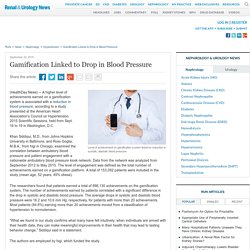
Khan Siddiqui, M.D., from Johns Hopkins University in Baltimore, and Ross Goglia, M.B.A., from higi in Chicago, examined the correlation between ambulatory blood pressure and patient engagement with a nationwide ambulatory blood pressure kiosk network. Data from the network was analyzed from September 2012 to May 2015. The level of engagement was defined as the total number of achievements earned on a gamification platform. The researchers found that patients earned a total of 898,130 achievements on the gamification system. Source. Vital Signs: Predicted Heart Age and Racial Disparities in Heart Age Among U.S. Adults at the State Level.
September 1, 2015 / 64(Early Release);1-9 Quanhe Yang, PhD1; Yuna Zhong, MSPH1; Matthew Ritchey, DPT1; Mark Cobain, PhD2; Cathleen Gillespie, MS1; Robert Merritt, MA1; Yuling Hong, MD, PhD1; Mary G.
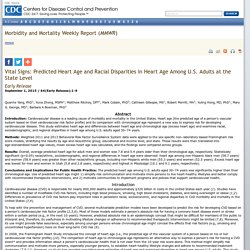
George, MD1; Barbara A Bowman, PhD1 Abstract Introduction: Cardiovascular disease is a leading cause of morbidity and mortality in the United States. Heart age (the predicted age of a person's vascular system based on their cardiovascular risk factor profile) and its comparison with chronological age represent a new way to express risk for developing cardiovascular disease. Methods: Weighted 2011 and 2013 Behavioral Risk Factor Surveillance System data were applied to the sex-specific non–laboratory-based Framingham risk score models, stratifying the results by age and race/ethnic group, educational and income level, and state. Obese Americans now outnumber those who are merely overweight, study says. Americans have reached a weighty milestone: Adults who are obese now outnumber those who are merely overweight, according to a new report in the journal JAMA Internal Medicine.
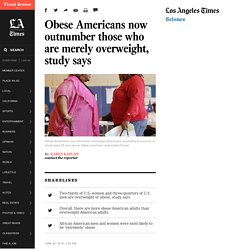
A tally by researchers from Washington University School of Medicine in St. Louis estimated that 67.6 million Americans over the age of 25 were obese as of 2012, and an additional 65.2 million were overweight. Their count was based on data collected between 2007 and 2012 as part of the National Health and Nutrition Examination Survey, an ongoing study conducted by the Centers for Disease Control and Prevention. The NHANES data included information on height and weight, which are used to calculate a person’s body mass index. A BMI between 18.5 and 24.9 is considered normal. Women were much more likely to be obese than overweight, with 37% of women in the former category and 30% in the latter. The proportion of men who were obese was almost as high as women – 35%.
Medscape Log In. Your Definitive Guide to Losing Body Fat. Getty Images Let's face it—fat has gotten an unfortunate rap.
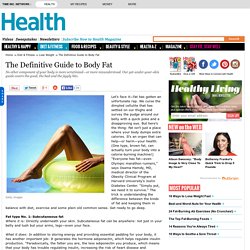
We curse the dimpled cellulite that has settled on our thighs and survey the pudge around our belly with a quick poke and a disapproving eye. But here's the thing: Fat isn't just a place where your body dumps extra calories. It's an organ that can help—or harm—your health. (One type, brown fat, can actually turn your body into a calorie-burning machine!) Fat type No. 1: Subcutaneous fat Where it is: Directly underneath your skin.
What it does: In addition to storing energy and providing essential padding for your body, it has another important job: It generates the hormone adiponectin, which helps regulate insulin production. RELATED: 11 Reasons Why You're Not Losing Belly Fat Already active? Fat type No. 2: Visceral fat Where it is: Nestled deep within your belly, where it pads the spaces around your abdominal organs. Personalized therapy for cardiovascular disease. Researchers at the Montreal Heart Institute announced today results showing that patients with cardiovascular disease and the appropriate genetic background benefit greatly from the new medication dalcetrapib, with a reduction of 39% in combined clinical outcomes including heart attacks, strokes, unstable angina, coronary revascularizations and cardiovascular deaths.
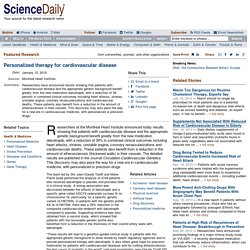
These patients also benefit from a reduction in the amount of atherosclerosis (thickened walls) in their vessels. The detailed results are published in the Journal Circulation Cardiovascular Genetics. This discovery may also pave the way for a new era in cardiovascular medicine, with personalized or precision drugs. The team led by Drs Jean-Claude Tardif and Marie-Pierre Dubé performed the analysis of 5749 patients who received dalcetrapib or placebo and provided DNA in a clinical study. The investigators tested multiple genetic markers across the entire genome in a procedure called genome-wide association study.
How Exercise Changes Our DNA. Photo Phys Ed Gretchen Reynolds on the science of fitness.
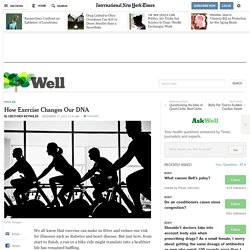
Hyperlipidemia. Cholesterol. Aortic Aneuysms. CAD. Hypertension. Homocysteine. Endothelial Function And AI Index. EndoPAT Publications. Cardiac Disease. Blood Pressure.